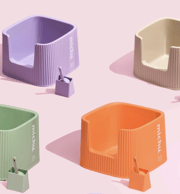Why are petrol prices so high right now?
- Replies 3
On October 18, Sydney broke new ground when the average price for regular unleaded petrol breached 170 cents per litre, following in the footsteps of other major cities such as Melbourne (174.7 cents per litre) and Brisbane (176.6 cents per litre).
Experts are worried stating that there is currently ‘no end in sight’ for high petrol prices so motorists better prepare their wallets.

Why are fuel prices so high, and who sets them? Photo by Scott Barbour/Getty Images.
You’re probably asking, “why is petrol fuel currently so expensive?”
The answer is that the price of crude oil – the major ingredient of petrol – is currently at an all-time high.
Since the world is waking up from its pandemic-induced economic slumber, restarting the global economy takes a huge toll on natural resources.
Crude oil is a finite resource, and since the supply is not keeping up with the demand, the cost of the resource itself is rising.
In simpler terms, the more costly it is to buy a barrel of oil, the more expensive it is for a fuel refinery to take that oil and distillate it into the same product your car is powered with.
Crude oil is a major component, but it is not the only factor that affects petrol prices.
Other factors include the local competition. For example, you're more likely to get cheaper fuel in a city full of petrol stations than in the outback.
The value of the Australian dollar compared to the US dollar also affects petrol prices. Costs like the Australian Government fuel excise are also considered.
The Australian Government fuel excise set at 43.3 cents per litre is included in the price you pay for unleaded petrol, as recorded in August 2021.

The National Average as of October 24, 2021, is 169.5 cents per litre while the Total Metropolitan Average is 172.4 cents per litre. Photo from Australian Institute of Petroleum.
With all factors considered, it is still the market that sets the price of petrol.
Petrol companies must make sure their business executives are covered, that they aren't losing too much against the competition, and that they are making a profit.
The range must play within a fairly narrow "band" of prices, so it doesn't seem too explicit.
Companies make various business decisions so they can offer lower fuel prices such as: not having to pay rent, having lower staffing levels, better marketing and location placement, and many more.
Basically, retailers keep a very close eye on what the competition is charging so they can adjust their prices to follow.
So, why don’t they just increase their prices so they can earn more profit?
Thankfully, there are a few safeguards in place to prevent outrageous price increase.
The first is the simple concept of market forces. For example, if one petrol supplier decides to charge $10 a litre for petrol, and another charges a normal rate of $1.50, it only makes sense for customers to flock to the affordable option, resulting in the more expensive station losing all of its business to the cheaper one.
The quality of Australia’s petrol is strictly regulated, so it’s unlikely that motorists will pay more for a similar grade fuel just because of the ‘branding’.
Another safeguard is the Australian Competition and Consumer Commission (ACCC).
Even though the ACCC does not set fuel prices, the organisation monitors them on a daily basis. Anti-competitive activities such as secret meetings to "agree" on a standard price are investigated and promptly disallowed.

Petrol stations have to pay rent, wages, electricity bills, transport costs, storage costs and more. Photo from Bloomberg.
Will petrol prices go down in the near future?
Once crude oil production picks up to full capacity, more supply would mean the price of petrol would also decrease.
But according to Donald Farquhar from Compare the Market, this may not be until mid-November.
"Brisbane remains the most expensive capital city for petrol. Suddenly that long-weekend road trip to the Gold Coast might be looking a lot more expensive," Mr Farquhar said.
"Projections based on current trends suggest motorists in Sydney, Brisbane and Melbourne won't see better prices for another four weeks."
Experts are worried stating that there is currently ‘no end in sight’ for high petrol prices so motorists better prepare their wallets.
Why are fuel prices so high, and who sets them? Photo by Scott Barbour/Getty Images.
The answer is that the price of crude oil – the major ingredient of petrol – is currently at an all-time high.
Since the world is waking up from its pandemic-induced economic slumber, restarting the global economy takes a huge toll on natural resources.
Crude oil is a finite resource, and since the supply is not keeping up with the demand, the cost of the resource itself is rising.
In simpler terms, the more costly it is to buy a barrel of oil, the more expensive it is for a fuel refinery to take that oil and distillate it into the same product your car is powered with.
Crude oil is a major component, but it is not the only factor that affects petrol prices.
Other factors include the local competition. For example, you're more likely to get cheaper fuel in a city full of petrol stations than in the outback.
The value of the Australian dollar compared to the US dollar also affects petrol prices. Costs like the Australian Government fuel excise are also considered.
The Australian Government fuel excise set at 43.3 cents per litre is included in the price you pay for unleaded petrol, as recorded in August 2021.
The National Average as of October 24, 2021, is 169.5 cents per litre while the Total Metropolitan Average is 172.4 cents per litre. Photo from Australian Institute of Petroleum.
Petrol companies must make sure their business executives are covered, that they aren't losing too much against the competition, and that they are making a profit.
The range must play within a fairly narrow "band" of prices, so it doesn't seem too explicit.
Companies make various business decisions so they can offer lower fuel prices such as: not having to pay rent, having lower staffing levels, better marketing and location placement, and many more.
Basically, retailers keep a very close eye on what the competition is charging so they can adjust their prices to follow.
So, why don’t they just increase their prices so they can earn more profit?
Thankfully, there are a few safeguards in place to prevent outrageous price increase.
The first is the simple concept of market forces. For example, if one petrol supplier decides to charge $10 a litre for petrol, and another charges a normal rate of $1.50, it only makes sense for customers to flock to the affordable option, resulting in the more expensive station losing all of its business to the cheaper one.
The quality of Australia’s petrol is strictly regulated, so it’s unlikely that motorists will pay more for a similar grade fuel just because of the ‘branding’.
Another safeguard is the Australian Competition and Consumer Commission (ACCC).
Even though the ACCC does not set fuel prices, the organisation monitors them on a daily basis. Anti-competitive activities such as secret meetings to "agree" on a standard price are investigated and promptly disallowed.
Petrol stations have to pay rent, wages, electricity bills, transport costs, storage costs and more. Photo from Bloomberg.
Once crude oil production picks up to full capacity, more supply would mean the price of petrol would also decrease.
But according to Donald Farquhar from Compare the Market, this may not be until mid-November.
"Brisbane remains the most expensive capital city for petrol. Suddenly that long-weekend road trip to the Gold Coast might be looking a lot more expensive," Mr Farquhar said.
"Projections based on current trends suggest motorists in Sydney, Brisbane and Melbourne won't see better prices for another four weeks."








